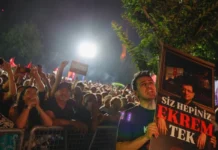An NGO report on hate speech in Turkey that was prepared with funding from the European Union was widely criticized for ignoring the prevalent hate speech targeting the Gülen movement in the country.
The report, titled “Türkiye Yazılı Basınında Nefret Söylemi” (Hate Speech in Turkey’s Print Media) and published by IPS Communication Foundation/Bianet, said it documented 21 instances of hate speech in Turkish newspapers between November 15, 2023 and March 1, 2024.
The incidents covered in the report targeted refugees, LGBT individuals, Jews, Greek Cypriots, Greeks, Russians, Arabs and Armenians.
While the report cites the definition of hate speech put forward by the Council of Europe’s Committee of Ministers, which includes “all types of expression that incite, promote, spread or justify violence, hatred or discrimination against a person or group of persons,” it included no cases related to real or perceived members of the Gülen movement, a faith-based group whose systematic dehumanization and persecution at the hands of the Turkish government and the mainstream media in Turkey has been repeatedly documented by human rights groups, international organizations and the asylum agencies of Western governments.
Turkish President Recep Tayyip Erdoğan has been targeting followers of the Gülen movement, inspired by Turkish Muslim cleric Fethullah Gülen, since the corruption investigations of December 2013, which implicated then-prime minister Erdoğan, his family members and his inner circle.
Dismissing the investigations as a Gülenist coup and conspiracy against his government, Erdoğan designated the movement as a terrorist organization and began to target its members. He intensified the crackdown on the movement after an abortive putsch in 2016, which he accused Gülen of masterminding. Gülen and the movement strongly deny involvement in the coup attempt or any terrorist activity.
Erdoğan and his ruling Justice and Development Party (AKP) government have coined the derogatory term “FETÖ” to refer to the movement as a terrorist group. Although the UN, the EU and most national governments have refrained from adopting the term, its use has spread in Turkey to the justice system, the media and general public discourse.
Ali Yıldız from the Brussels-based Arrested Lawyers Initiative told SCF that the exclusion of the group from the hate speech report is part of a broader pattern of discrimination that goes beyond the Turkish government and the pro-government circles in the country.
“Using Edward Herman and Noam Chomsky’s notion of ‘worthy and unworthy victims’ as an analogy, people perceived as members of the Gülen movement are unworthy victims for most Western NGOs and also for the pro-Western elite in Turkey,” he said. “For example, Amnesty International completely ignores the persecution of the movement in its annual reports, just as this report ignores the colossal hate speech campaign against it.”
Another Brussels-based human rights NGO, Solidarity with OTHERS, runs a database project titled “Hate Monitoring” aimed at documenting the scale of hateful rhetoric targeting the movement.
According to the database, the group or its members were targeted by government agencies, politicians, journalists, social media personalities and other prominent figures in at least 149 instances of hate speech since 2020.
Haşim Tekineş from the Institute for Diplomacy and Economy (instituDE) told SCF that while there are several groups in Turkey subjected to hate speech, the dehumanization of the Gülen movement stands out as it is perpetuated by almost all segments of society, including government critics and minorities.
“The Bianet report is not the only case that overlooks the hate crimes against the Gülen movement,” he said. “Most human rights activists and news outlets choose to respect government-designated boundaries when it comes to the movement.”
“This, however, is not a simple mistake. It is complicity in government crimes – complicity that multiplies the effects of government persecution and dehumanization.”
Since the 2016 attempted coup, the large-scale mistreatment of the Gülen group has involved mass and arbitrary detention, repeated allegations of torture and ill-treatment in custody and in prisons, violations of the right to a fair trial, the summary dismissal of public sector workers and members of the judiciary accused of links to the group.
Several opinions released by the UN Working Group on Arbitrary Detention have said the widespread or systematic imprisonment of individuals with alleged links to the group may amount to crimes against humanity, while a landmark judgment released by the European Court of Human Rights (ECtHR) in late 2023 found systemic deficiencies plaguing the trials of thousands of people accused of affiliation with the movement and typically handed down lengthy prison sentences.
Rights groups and activists often complain that the dissemination of hateful rhetoric against the group, including the wide acceptance of the government’s derogatory terminology in Turkey, creates a climate that justifies and facilitates the mistreatment of the movement.















